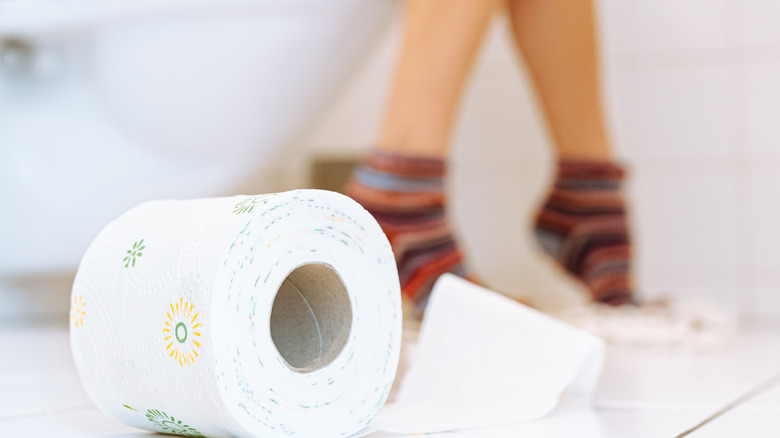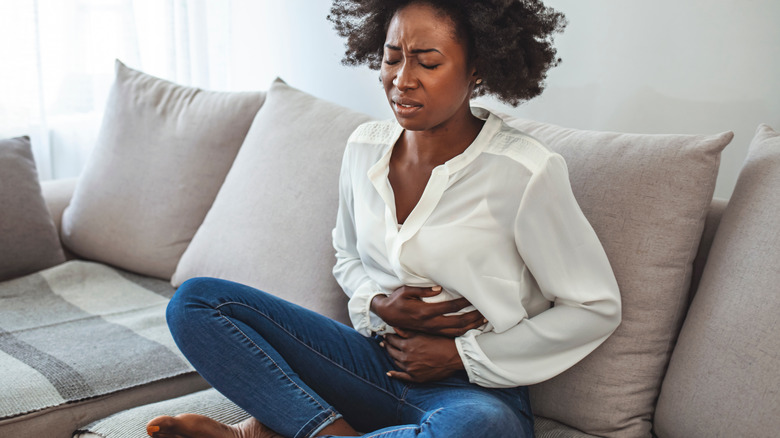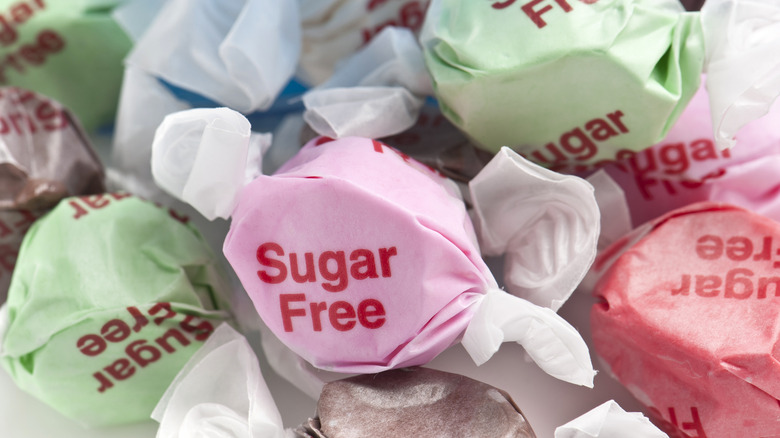The Weird Reason Sugar-Free Foods Make You Poop
Having the option of sugar-free foods is especially beneficial for those who are watching their blood glucose levels. Unlike actual sugar, which has 4 calories per gram, sugar alcohols (polyols), which are what you find in "diabetes-safe" products, have 0.2 to 2.7 calories per gram. Common sugar alcohols include xylitol, erythritol, isomalt, lactitol, maltitol, mannitol, sorbitol, and hydrogenated starch hydrolysates (HSH), per Yale New Haven Health.
Although they contain the word "alcohol," sugar alcohols don't actually have any alcohol in them. They're just chemically similar to both sugar and alcohol. In addition to containing fewer calories than actual sugar, these mostly manmade forms of sugar are also low-glycemic foods and don't cause tooth decay, which is why you see some of them listed on toothpaste.
Pros aside, sugar-free foods do have a side effect when consumed in larger doses: they can cause diarrhea in some people. You may have seen this warning on the labels of candies, chewing gums, or chocolates that contain the stuff: "Excess consumption may have a laxative effect." This is because sugar alcohols aren't as easily digested in your system as regular sugar is. For some people, the side effects might include more than just pooping instantly. Gas and bloating can be issues, too. "They're not completely absorbed or digested; they pass through the small intestine and are fermented in the large intestine, and that fermentation can cause gas," shared registered dietitian Joy Dubost (via U.S. News and World Report).
Those with digestive issues should be careful with sugar alcohols
People with digestive issues like irritable bowel syndrome (IBS), Chron's disease, small intestinal bacterial overgrowth (SIBO), or candida overgrowth should be especially careful when consuming foods labeled "sugar-free." A 2017 study published in the journal Advances in Nutrition found that polyols, which are also naturally found in plants, can cause gastrointestinal discomfort, flatulence, and laxative effects in people with IBS.
According to functional medicine physician Dr. Amy Myers, consuming sugar alcohols when you have SIBO or candida overgrowth is tantamount to making things worse. "Sugar alcohols feed opportunistic candida and excess bacteria that colonize in the small intestine the same way as regular table sugar," which, as the expert explained, can lead to constipation, bloating, and diarrhea. People who have sensitivities to FODMAPs (fermentable oligosaccharides, disaccharides, monosaccharides, and polyols) should be careful when consuming sugar-free foods. While there certainly are times when we wish we had a poop button to help keep things moving, diarrhea is obviously not the answer.
What to consider when consuming sugar-free foods
While considered generally safe to add to the diets of those watching their sugar levels, it is important to understand the risks of sugar alcohols before consuming them and making them a part of a healthy diet.
For starters, what foods contain sugar alcohols? While a quick check of the label can easily tell you the ingredients, various treats and sweets (such as low-calorie energy bars, cakes, cookies, ice cream, jams, chocolates, and candies) can contain the stuff. There might even be times when some sugar alcohols (like erythritol) aren't listed on the label, simply because the U.S. Food and Drug Administration (FDA) doesn't require it (per Cleveland Clinic). This is when you should be paying attention to the alternative wordings like "sugar-free," "diabetes-safe," "keto-safe," and "calorie-free," shared registered dietitian Tegan Bissell. "Just as sugar lurks behind different terms on food labels, sugar alcohols also have many names," added the expert.
As for just how much you can consume, for those with digestive issues, it might sometimes mean trial and error to see what works. Consuming 10 to 15 grams a day is generally considered safe, but again, this might depend on how sensitive you are to polyols. Poop health is a big part of overall health, and while all of us want to be regular in the bathroom by maintaining a healthy diet, sufficient hydration, and exercise, there is no need to cause diarrhea or other digestive discomfort by going overboard with sugar-free foods.



